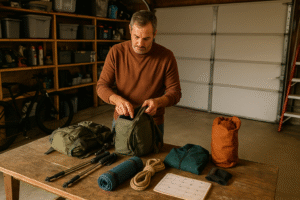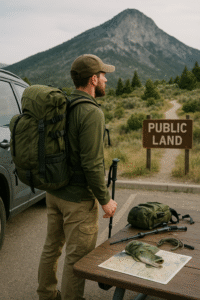Regular hiking offers a simple way to get outdoors and move your body, but the benefits go way beyond just stretching your legs. Spending a few hours out on the trail each week can support your physical, mental, and even social wellbeing. Whether you’re a weekend warrior or just starting to explore local trails, hiking brings a lot to the table. In this article, I’ll walk you through the real-life perks of making hiking part of your routine; you’ll also find tips and answers to common questions that hikers often have as they get into this activity.

Physical Benefits of Regular Hiking
Heading out for a hike does more than get your heart pumping. Hiking helps you stay active in a way that feels rewarding and not just like a chore or an obligation. There are a bunch of physical benefits that come with lacing up your boots and hitting a dirt path.
Walking on uneven natural surfaces works your legs, core, and even smaller stabilizer muscles you might not use much on flat ground. Depending on the trail, you might find yourself climbing, stepping over rocks, or maneuvering around roots. This variety of movement can boost your strength and balance:
- Improved Cardiovascular Health: Hiking raises your heart rate, similar to jogging or cycling, which helps lower blood pressure and improve circulation over time.
- Boosted Muscle Tone: Trails with hills and inclines push your glutes, quads, and calves harder. Using hiking poles adds some upper body effort, too.
- Joint Strength and Flexibility: The varied movement supports joint health and helps keep your hips, knees, and ankles flexible.
- Better Balance and Coordination: Navigating uneven paths challenges your balance, training your body to adjust quickly, which is pretty handy as you age.
On top of that, spending time outside in the sunlight gives your body a natural dose of vitamin D, important for bone health. If you’re consistent, hiking can also help with weight management and boost your stamina for other activities, from everyday walking to more intense sports.
I personally manage my day to day diet with a Keto type of diet. It helps me maintain my lean muscle and gives me the day to day energy I need. When I know I have a more strenuous activity coming up I incorporate more carbohydrates into my diet to help with energy levels. I did that on one of my latest trips to the mountains of Maryland. Consult with your doctor before beginning any diet regiment but here a a couple styles that may work for you.
Mediterranean Diet Plan- Take the 1 Minute Quiz Now!
Keto Diet Plan- Take the 1 Minute Quiz Now!
Mental Health and Emotional Wellbeing

The mental benefits of hiking might be even more noticeable than the physical perks for some people. Being outside isn’t just a nice break from your regular routine; it’s actually linked to lower stress, better mood, and sharper thinking. Researchers have found that even short walks in nature can help reduce symptoms of anxiety and depression.
- Stress Relief: Natural environments offer a calm place, letting your mind relax and reset, away from daily pressures and noise.
- Sharper Focus: Time away from screens and city noise can help boost concentration and creativity. Walking off a problem or coming home with new ideas is a real thing.
- Improved Sleep: Outdoor exercise helps set your body clock, making falling asleep—and staying asleep—easier.
- Boosted Confidence: Achieving a hiking goal, like reaching a scenic viewpoint or finishing a new trail, brings a rewarding sense and can lift your self-worth.
Some people swear by the “nature fix”—a sense of mental recharge that comes from being outside for a few hours. For me, hiking is a chance to decompress and return home with a fresh perspective. Plus, the positive impact on mood is not just hearsay; it’s continually backed up by scientific studies. Stepping outside, taking in some fresh air, and getting into the rhythm of walking can do wonders for your headspace.
Preparation: Building Hiking into Your Weekly Routine



Getting the most out of hiking means being prepared and making it a habit. Even if you’re not aiming for rugged mountain trails, laying out a game plan makes hikes both enjoyable and safer. Here are some steps that have helped me keep hiking a regular part of my weeks:
- Pick the Right Trail: Start with shorter, local paths to get comfortable. As your confidence builds, move up to longer or steeper routes.
- Gear Up: Reliable shoes, layered clothing, and a compact pack for snacks and water will make things a lot easier. Check the weather beforehand so you can plan accordingly.
- Block Off Time: Schedule your hike like any other important event. A Saturday morning hike or a weekly group meet-up can keep you consistent.
- Invite a Friend: Hiking with someone else adds accountability and makes trails more social and fun.
- Track Your Progress: Use free hiking apps or jot down notes to remember which trails you’ve tried and distances covered.
Don’t skip the basics: plenty of water, a good snack, sunscreen, and a map—either paper or digital—to keep from getting lost. If you’re starting out, focus on easy strolls in local parks or nature preserves and ramp up to more challenging hills as you build stamina.
Sometimes, having a simple checklist before heading out can keep you feeling confident. Gloves, hats, sunglasses, and insect repellent are small extras that make a big difference, especially depending on the season and location you pick for your hike.
Common Challenges and How to Tackle Them
As with any new activity, hiking throws a few hurdles your way. Here are some common snags I encountered and what helped me handle them:
- Weather Surprises: Unexpected rain or chilly breezes can catch you off guard. Packing a lightweight rain jacket and keeping tabs on forecasts make it easier to avoid mishaps.
- Trail Safety: Stick to marked routes, avoid solo hikes in remote spots, and always let someone know your plans. Carrying a fully charged phone and a basic first-aid kit gives you backup if you need it.
- Physical Limits: It’s tempting to aim for big climbs right away, but sore legs and feet are no joke. Listen to your body, take breaks, and include rest days to help stave off injuries.
- Finding Time: Busy routines can push hiking to the back burner. I started with short, 30-minute sunset walks during the week and mixed in longer treks on weekends.
Gear Tips for Smooth Hiking
Shoes: Wearing comfortable, supportive hiking shoes or boots makes all the difference, especially on rough or slippery trails.
Backpack: Go for lightweight bags with a water reservoir pouch to stay hydrated and keep your hands free.
Navigation: Trail apps such as AllTrails help you stay on track, particularly in unfamiliar territory. Download offline maps for areas with poor cell service so you’re never lost.
A few bonus tips: Wear moisture-wicking socks to reduce blisters, and consider trekking poles if you’re tackling especially hilly trails. These little upgrades can make your hike go smoothly from start to finish.
Ways Hiking Supports Social Connections
Hiking isn’t just a solo pursuit; it’s a fantastic way to spend time with friends or meet new people. Group hikes and local hiking clubs get you connected with others who love the outdoors. If you want some company, organized hikes through park districts or outdoor stores are great to check out.
- Conversation Flows Easier: Walking side by side outside makes chatting more relaxed than meeting in a café.
- Familyfriendly: Short and easy trails are perfect for all ages. Turning hiking into a family habit can help kids build an appreciation for nature too.
- Meetups and Clubs: Many communities have hiking groups, meetups, or volunteer trail days for those who want to pitch in or get social.
Joining a group, or even saying hello to fellow hikers on the trail, can lead to lasting friendships or inspiring stories. Sometimes, the best conversations happen mid-hike, and the shared experience of reaching a viewpoint or finishing a loop creates a special connection.
Real-world Benefits: Hiking in Everyday Life
All these perks might sound good in theory, but the real value of regular hiking pops up in your everyday routine. I’ve noticed less tension after stressful weeks, more energy to tackle chores, and a deeper appreciation for green spaces in my area. Some friends have shared how hiking has helped with weight loss, managing blood sugar, or generally feeling more upbeat.
- Stress Busting: Trails give you a place to clear your head, leave your worries behind, and just soak up the present moment.
- Fun Fitness: Hiking turns exercise into a fun adventure, not just boring gym reps.
- Fresh Perspective: Eye-catching views and spotting wildlife add excitement to walks that might otherwise feel routine.
The boost in mood and sense of accomplishment after a hike often spill over into other parts of life. From handling work stress to staying motivated in other areas, the ripple effects of regular hiking are easy to spot once you get into it.
Frequently Asked Questions
Here are a few common questions I get from new hikers, along with what I’ve learned through experience:
Question: How often should I hike to notice benefits?
Answer: Even one or two hikes per week can spark a change. Consistency matters more than distance or difficulty at the start, so make it part of your regular routine.
Question: What if I live in a city without easy access to nature?
Answer: Try city parks, riverside trails, or even urban greenbelts. You’ll still get many of the same perks as rural hiking, from a mental boost to physical activity.
Question: Is hiking safe for people with joint issues or medical concerns?
Answer: Flat or paved trails are less stressful on your joints. If you have health questions, it’s best to check with your doctor before starting new activities.
Getting the Most Out of Your Hiking Routine
Keeping up with hiking means choosing trails and building habits that fit your schedule and interests. Switch up your routes, celebrate progress with a new piece of gear or a packed picnic, and share photos or stories from your best hikes. The more experiences you rack up, the easier it is to stay motivated over time. For me, it’s those small moments—a sudden clearing, a splash of birdsong, or a glimpse of deer on the trail—that keep bringing me back week after week.
If you’re aiming for better health, a sharper mind, or just an excuse to step outside, regular hiking is a super practical way to support your wellbeing from all angles. Lace up your sturdy shoes, stash a snack in your bag, and see where your next trail leads. You might just stumble upon something special—both out on the hike and in yourself.
